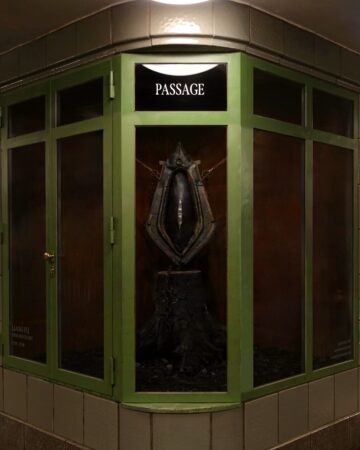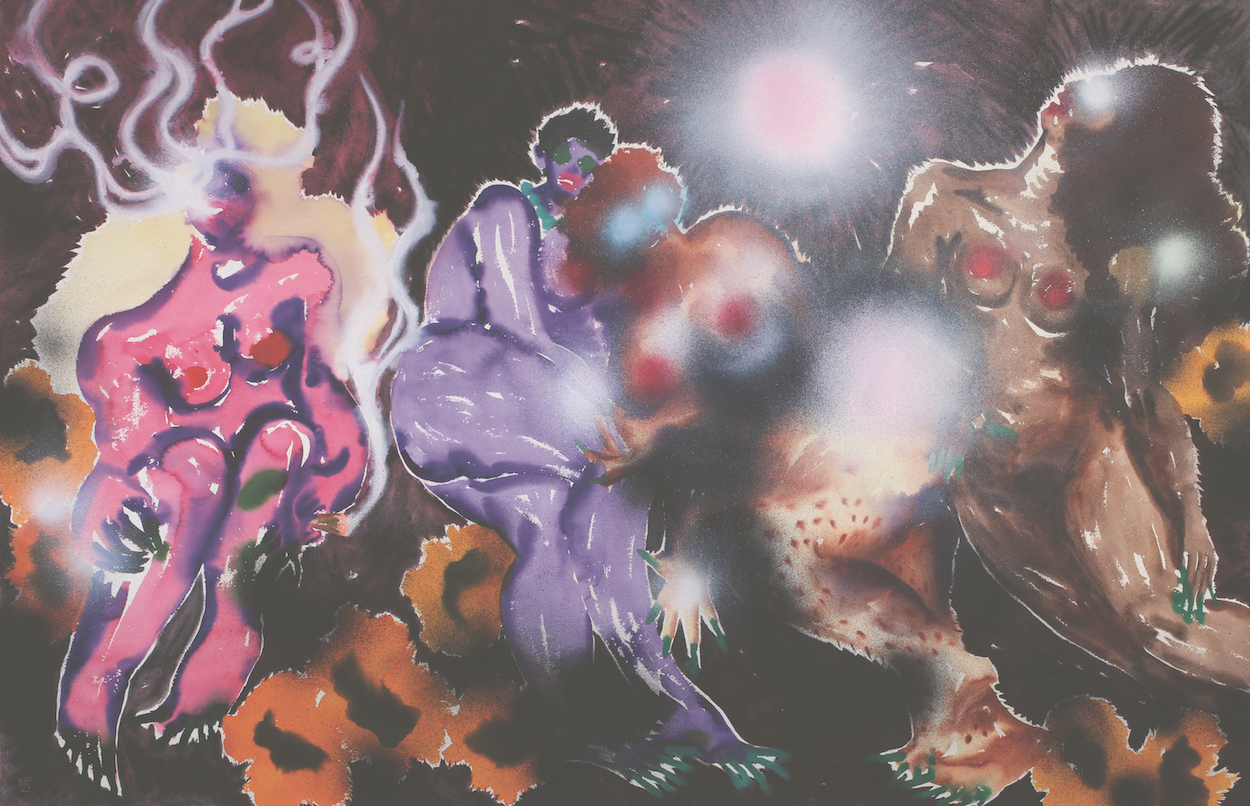
“SPINE BOUNDARY”: IN CONVERSATION WITH LIANG FU (FEAT. PASSAGE)
With his latest installation "SPINE BOUNDARY" at Hermannplatz, Berlin, Chinese born Artist…



According to a survey conducted by the Pew Research Center, in 2020, only 21% of Americans trust the government to do what is right most of the time. That’s a pretty damning statistic. In light of that, for most people, there is a choice – to engage or dissociate entirely. Of course, there’s always fulfillment in the world of work. Gallup research showed that employees who are passionate about their work are a whopping 2.5 times more likely to be engaged. It’s times like this that we all remember the classic high-school yearbook prompt: most likely to be economically engaged.
The issue here is that most people’s jobs are trash. In Bullshit Jobs: A Theory, David Graeber says that many individuals find themselves in roles that lack purpose or meaning. In an era of economic precarity, job insecurity, and the inability to own a home, late millennials and Gen Z grapple with jobs that provide little fulfillment or stability. Social and cultural apathy, influenced by social media, the pandemic, and political intensity, has fostered disconnection, anti-social behavior, and a declining birth rate.
In a world shaped by unprecedented challenges and dynamic changes, the emotional responses of individuals have evolved into a complex interplay between passion and apathy. These two contrasting forces have become defining features of our time, shaping how people engage with the world around them.
A DRIVING FORCE FOR CHANGE
A vibrant and powerful emotion, passion has always proved to be a driving force for transformative movements and activism. Think Greta Thunberg and global climate strikes leading to a commitment to environmental causes that transcend generational boundaries. Or, the 2020 elections in the United States stand as a testament to passionate civic engagement, with increased voter turnout reflecting a commitment to shaping the political landscape for the better.
Emotionally, passion brings forth feelings of excitement, joy and fulfillment. Psychologically, it propels individuals and societies to set and achieve meaningful goals, fostering resilience and personal growth. Behaviorally, passionate individuals actively engage in their chosen pursuits, investing time and effort to make a tangible impact.
In our exploration of passion, it is essential to acknowledge the potential pitfalls that can arise when enthusiasm becomes overwhelming. While passion is generally hailed as a positive force propelling individuals toward their goals, an unbridled and all-consuming fervor can lead to burnout and adverse effects on mental well-being. The dangers lie in the relentless pursuit of perfection, self-imposed pressures, and the disregard for personal boundaries. Interviews with professionals across various fields will shed light on their experiences with burnout, emphasizing the importance of maintaining a healthy balance between passion and self-care. It’s a cautionary tale that highlights the need for individuals to tread carefully along the line between unwavering dedication and the preservation of their mental and physical health.
Yet, amidst the fervor of passion, a not-so-silent undertow of apathy has permeated certain aspects of society. Characterized by a lack of interest and emotional detachment, apathy has manifested in various forms, contributing to a sense of disillusionment.
Apathy’s grip extends beyond personal disinterest; it permeates societal structures, contributing to a lack of engagement and fostering a pervasive sense of disconnect. By delving into the consequences of apathy in various contexts, from civic disengagement to its impact on community dynamics, we aim to uncover the ripple effects that extend far beyond individual experiences. As we navigate the delicate interplay between personal choices and societal implications, a nuanced understanding of the dangers of apathy emerges, urging us to consider the broader impact of our emotional states on the fabric of our communities.
Statistically, a rise in voter apathy in specific regions during recent elections signals a disconnect among individuals who feel disinterested or disillusioned with the political process. The mental health landscape has also seen an increase in feelings of apathy, particularly among younger generations, possibly linked to the multifaceted challenges posed by the global pandemic, sociopolitical uncertainties, and the climate emergency.
Emotionally, apathy leads to numbness or indifference, a void where passion once thrived. Psychologically, it can result from burnout, disillusionment, or a perception of helplessness, impacting mental health and overall life satisfaction. Behaviorally, apathetic individuals may withdraw from social interactions, avoiding responsibilities and displaying a general lack of initiative.
BLACK MIRRORS
What we watch, read and listen to speaks volumes about how we feel. The passions that resonate within the late millennial and Gen Z often have dominant themes of dystopia, resilience and rebellion. Cinematic narratives and auditory landscapes encapsulate the existential anxieties and aspirational dimensions of an epoch defined by the uncertainties and anxieties of a generation that came into a world facing climate crises, economic challenges, and social unrest.
From post-apocalyptic worlds to narratives exploring the consequences of unchecked power, dystopian themes echo the concerns and fears embedded in our collective consciousness. Hauntology, as theorized by Jacques Derrida and later expanded upon by cultural critics, adds another layer, suggesting that our narratives are haunted by a sense of the future that has eluded us—a future that appears distant and uncertain.
From protagonists defying oppressive systems to stories of social justice warriors, the theme of rebellion aligns with the desire for change and a refusal to accept the status quo. Hauntology, in this context, suggests that these narratives are not just about the present or the past; they are haunted by a future that feels inaccessible, pushing us to question and challenge existing structures in the pursuit of an alternative future.
The phenomenon of countless reboots in entertainment further underscores the hauntological perspective. In an era marked by uncertainty, the recurrence of familiar narratives and characters may be interpreted as an attempt to grapple with the absence of a clear future. Reboots, in their repetition, reflect a cultural yearning for a more familiar and perhaps more certain past— one revisited in the absence of a defined future.
As we immerse ourselves in these cultural narratives, we navigate a landscape haunted by the specter of an uncertain tomorrow. Hauntology provides a framework for understanding the complexities of our cultural choices, suggesting that our entertainment serves as both a reflection of our present concerns and a spectral exploration of a future that seems to elude our grasp. In the darkness of the cinema and the glow of our screens, we confront not only the fears and desires of the present, but also the ghosts of a future yet to unfold.
INVENTING THE FUTURE
In his book, Inventing the Future, Nick Srnicek meditates on the notion that advancements in technology, particularly automation and artificial intelligence, have the potential to liberate humanity from the drudgery of work. Giving more time and headspace to focus on enacting change in society.
“Apathy is a symptom of a society that lacks a clear vision of the future. To combat apathy, we must articulate and work towards a transformative vision that captures the collective imagination.”
Srnicek urges us to confront the root cause of collective disengagement. It is an assertion that resonates deeply in an era marked by uncertainty, where societal currents often flow without a discernible destination. He proposes to break free from the inertia of established norms and envision a future where cultural, political and social institutions no longer perpetuate the malaise of disengagement. The status quo is not a fixed reality, but a malleable construct that demands scrutiny and reconstruction. Apathy is not an inherent trait, but a response to systems that fail to inspire or provide a compelling vision of the future.
Challenging the status quo implies a willingness to question deeply ingrained assumptions about how we organize and govern our societies. It prompts a reconsideration of cultural narratives, political structures, and social norms that may contribute to the prevailing sense of disillusionment.
To heed Srnicek’s call to action, we must embark on a journey of articulation and transformation. The onus lies not only on individuals, but on society as a whole to collectively imagine and articulate a vision of the future that transcends the status quo. In doing so, we confront the disquieting reality that the prevailing structures and systems may not be conducive to fostering a sense of purpose or shared destiny. This realization propels us into uncharted territory, demanding a deliberate and conscientious effort to redefine societal values, aspirations and trajectories.
After years of hoping for real change, many have become disenchanted with politics. It seems more about preserving the status quo than addressing the real issues affecting everyday people. The promise of transformative policies often gives way to a sense of stagnation, leaving citizens feeling unheard and disconnected from the political processes that shape their destinies.
The disillusionment with politics stems from a perceived lack of genuine commitment to addressing real, tangible issues. Instead of witnessing bold initiatives to tackle societal challenges, individuals often observe political maneuvers that prioritize partisan interests or short-term gains. This disillusionment is exacerbated by a growing sense of disconnection between the political elite and the concerns of ordinary citizens.
The prevailing sentiment echoes a desire for authentic representation and meaningful change, a yearning for politics to be a vehicle for societal progress rather than a mechanism for self-preservation. The result is a disheartened electorate, questioning the efficacy and authenticity of political systems that seem detached from the struggles and aspirations of those they are meant to serve.
WHAT NEXT?
In the evolving landscapes of work, society and culture, it becomes evident that our emotional responses are intertwined with the uncertainties of our time. While passion propels us towards meaningful goals, we must remember that which our passion is being directed towards and by whom. Dedication to meaningless jobs is only an act of self-preservation when one is frank about the unbelievably dire lack of credible alternatives.
We are the first generation to come into the world in a moment of global omnicrisis. Social, climate, economic — you name it, it’s fucked. The inability to own a home, find a job that one is passionate about coupled with the projection of unattainable lifestyles on social media and increasingly intense political environments across the board. Is it any wonder that the birth rate in the developed world is plummeting?
Though absolutely understandable, apathy poses a risk to societal engagement and well-being. It manifests in various forms, from political disinterest to personal withdrawal, creating a pervasive sense of disconnect that is self-reinforcing and genuinely worrying. The cultural choices we make, from entertainment preferences to the narratives we consume, are not mere reflections of our present, but haunted explorations of a worrying future.
As the writer, activist and holocaust survivor Elie Wiesel famously wrote:
“The opposite of love is not hate, it’s indifference. The opposite of art is not ugliness, it’s indifference. The opposite of faith is not heresy, it’s indifference. And the opposite of life is not death, it’s indifference.”
Passion is existential while apathy is manufactured.